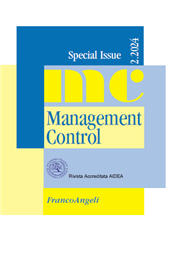Advancing Induced Models of Management Accounting Change : a Dynamic Perspective
99-124 p.
This research represents a progressive evolution of the induced model for management accounting change (MAC), originally proposed by Innes and Mitchell (1990), later enriched by Cobb et al. (1995) and Kasurinen (2002). To this end, using a longitudinal case study, this research employs Lewin's (1943) force field theory to present and interpret the dynamics of contextual factors underlying the change scenario. The study makes two main contributions to the literature. First, it advances Kasurinen's (2002) MAC framework by adding three elements that incorporate a longitudinal perspective. The study acknowledges that the forces driving change differ across organizations and evolve within individual organizations over time, both in terms of nature and intensity. This underscores the need for a flexible MAC model capable of tracking these forces at any given point in time.
Moreover, the findings indicate that MAC can generate new factors that further influence its progression, underscoring the importance of understanding the chain reactions triggered by change. This is crucial for effectively managing both driving and restraining forces throughout MAC's evolution. Finally, this study enhances Kasurinen's model by expanding its components. Acknowledging that human agents are the primary drivers of MAC, the refined model emphasizes the roles of organizational actors in adopting new practices, assessing information, and determining whether to continue, modify, or discontinue changes. These factors are essential for illustrating the dynamic evolution and interactions that drive organizational development and transformation. The second contribution lies in validating Kurt Lewin's force field theory within the domain of MAC. Although Lewin's framework is widely used in organizational change and management studies, its application in management accounting has been largely overlooked.
This study addresses that gap by demonstrating how Lewin's framework effectively reveals how changes are initiated and managed, thereby extending the applicability of his approach to the new context. [Publisher's Text].
Fa parte di
Management Control : 2, 2024 special issue-
Articoli dello stesso fascicolo (disponibili singolarmente)
-
Informazioni
Codice DOI: 10.3280/MACO2024-002-S1006
ISSN: 2239-4397
PAROLE CHIAVE
- Management Accounting Change (MAC), Induced model, Force field theory, Budgeting system, Costing systems, Aviation industry


